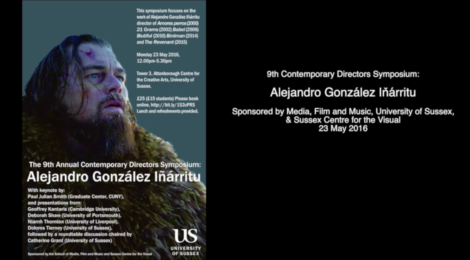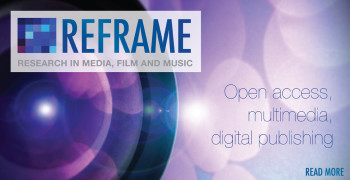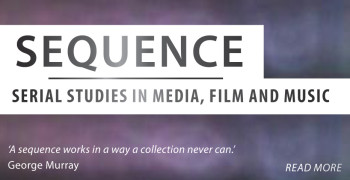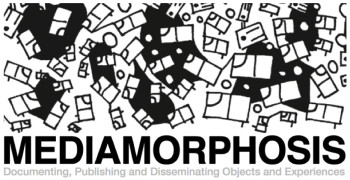
Recordings from 9th Annual Contemporary Directors Symposium on Alejandro González Iñárritu
Mediático is thrilled to present recordings of the five excellent papers given at the recent 9th Annual Contemporary Directors Symposium. This symposium this year focused on the work of Alejandro González Iñárritu director of Amores perros (2000), 21 Grams (2002), Babel (2006), Biutiful (2010), Birdman (2014) and The Revenant (2015). The event was organised by Mediático’s co-editor Dr Dolores Tierney and sponsored by the School of Media, Film and Music and the Sussex Centre for the Visual at the University of Sussex. It took place on May 23, 2016, at the Attenborough Centre for the Creative Arts, University of Sussex, Falmer, Brighton, East Sussex.
Introduction to the event by Organiser Dr Dolores Tierney (University of Sussex)
Welcome to the 9th Contemporary Directors Symposium. I’d like to thank the School of Media, Film and Music and the Sussex Centre for the Visual for their generous sponsorship of this event and also thank my colleague Michael Lawrence for his help in putting on this conference today and Catherine Grant for agreeing to be part of its line up, for recording the event and for her support in general. It’s also wonderful to have such a stellar group of attendees who I hope will be asking questions and offering lively commentary throughout the day.
When I first volunteered Alejandro González Iñárritu to be the director of focus for the 2016 Contemporary Directors Symposium it was before The Revenant and before even Birdman. In the Autumn of 2014, Iñárritu was still an auteur of what were classed in industry terms as “smaller budget art films” (Cook 2010:25) like Amores perros, 21 Grams, Babel and Biutiful. He was what Pam Cook would define as a non mainstream, stylistically innovative filmmaker exploring [clearly] alternative ideologies (2010:25). In the Autumn of 2014 Iñárritu was still making deterritorialized productions and brining his early collaborators and largely Mexican and Latin American creative team (Rodrigo Prieto, Brigitte Broch, Gustavo Santoalalla and Guillermo Arriaga – well up to Babel,) with him. But with Birdman –which still had key Latin American collaborators (Argentine screenwriters Armando Bo and Nicolas Giacobone, Mexican drummer Antonio Sanchez and of course cinematographer Emmanuel Lubezki – with an auteur status to match that of Iñárritu) there was a shift, he became a director of films that although still classed as still arty were more “popular art films” (Cook 2010:25) and although still alternative in its ideologies (throwing playful scorn on Hollywood superhero franchises, but also on the vanity of the Hollywood star –thinking he can gain artistic credibility by putting on a Raymond Carver play) –the perspective was definitely much less geographically aligned with Mexico and the Global South. With The Revenant a studio production with 20th Century Fox, costing $135 million and released as a tentpole production at almost 4000 theatres across the US (not unlike many superhero franchises) there has been a shift again. Without wanting to present Hollywood as a straightforwardly bad object because it never is, the terms on which we write about Iñárritu are changing. How much the way we conceive of him may change and any new terms we need to address whilst writing about him is something we may discuss today.
We have 5 super presentations for you today from renowned scholars of Mexican and Latin American cinemas drawn from across the world. We begin with Paul Julian Smith’s keynote.
It is with great pleasure that I introduce to you our keynote speaker: Professor Paul Julian Smith. Paul Julian Smith is Distinguished Professor of Hispanic and Luso-Brazilian Literatures and Languages at the Graduate Center of the City University of New York.
Professor Smith is a leading authority on the visual culture of Spain and Latin America and on the cinema of Alejandro González Iñárritu. He is the author of over 17 books including the BFI Classic on Amores perros (2003) and Mexican Screen Fiction: Between Cinema and Television (2014) which has a section on Iñárritu. He is also a columnist for Film Quarterly and a contributor to Sight & Sound –including a piece on Iñárritu’s Birdman. He was Chair of the Department of Spanish and Portuguese in Cambridge from 1993 to 2010.
It was as an undergraduate that I first heard him speak, when not just those studying Spanish, but also those studying English flocked to the Modern and Medieval Languages building to attend his seminars and lectures on Pedro Almodóvar. They were lively and electrifying events particularly for many of the students who had until that point led pretty sheltered lives. After I left university, Professor Smith came with me – in the first edition of his book on Almodóvar Desire Unlimited (now in its third expanded edition) which I carried and read on the London underground – drawing more than a few curious glances from those who read its title. Professor Smith has of course come with me in my academic career. His work is a joy to read, to assign to students and to use for research. He’s been hugely influential in my choice of career and I’m delighted that he has come here today to speak at Sussex University.
His talk is tantalizing entitled “Behind the Money: Iñárritu as Career Auteur”. There will be time for questions afterwards. Please join me in welcoming Professor Paul Julian Smith.
References:
Videos and Recordings by Dr Catherine Grant (University of Sussex)






